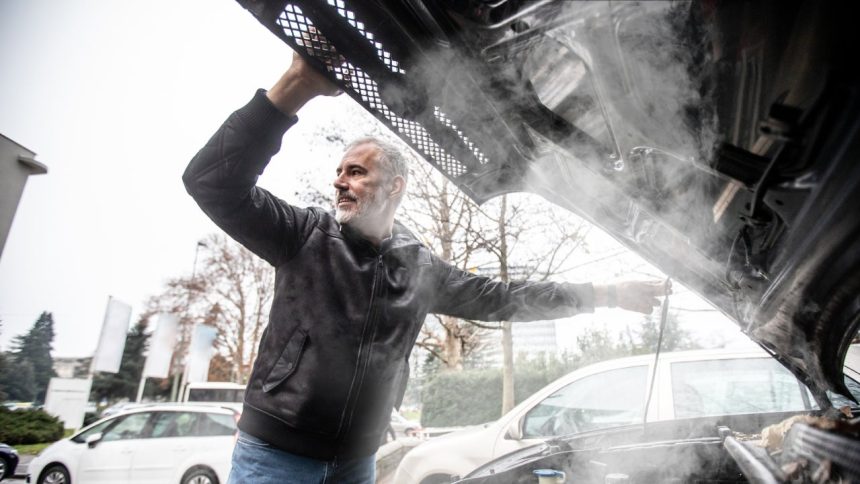If you’ve ever wondered if there’s a way to get insurance to cover a blown motor, Bankrate has some answers for you. Typically, unless the engine failure was caused by an accident, your insurance won’t pay for repairs. However, there are options for coverage. Mechanical breakdown insurance, for example, can come into play if you’ve got a dead engine and are looking for financial help in fixing it. You may also have coverage if you have an extended warranty on your vehicle. In this guide, Bankrate’s insurance editorial team reviews your options when you need to know if insurance covers engine failure.
How does insurance deal with engine failure?
To know how your insurance policy handles engine failure, it can help to be aware of the types of coverage you have. If you only have your state’s minimum liability coverage, for example, then your policy will only pay for damage and injuries to the other party in an at-fault accident — your own vehicle isn’t covered.
On the other hand, if you have full coverage, your policy covers damages to your own car in a variety of circumstances, through two specific types of coverage:
- Collision: As the name suggests, collision coverage pays for damages to your vehicle if you are in an at-fault accident.
- Comprehensive: Sometimes called “other than collision” coverage, this type of insurance helps pay to repair or replace your car if it is stolen, vandalized or damaged in a fire or other mishap like a severe weather event. It also covers damage from hitting an animal.
If your engine failure is due to an accident or other event covered by these two types of insurance, the damage is likely to be covered, once you pay your deductible. The catch, however, is that it generally won’t cover an engine that fails due to mechanical problems or normal wear and tear.
Will gap insurance cover engine failure?
If you’ve had car trouble, you may wonder if gap insurance covers engine failure. The answer is no, unfortunately it doesn’t. Gap insurance is an optional coverage that can be included in an auto insurance policy. If you have gap insurance, it will pay the difference between the book value of your totaled car and the amount you still owe on it. Gap insurance is something drivers who finance or lease their vehicles should consider if they are worried about being “upside down” on their loan or lease if the car is totaled in an accident.
This coverage is very specific and only activates if your car is totaled in a covered claim and you owe more than what the car is worth. It does not provide coverage for engine failure, normal wear and tear or other mechanical problems with your vehicle.
Is there any coverage that does cover engine failure?
In certain instances, you can get coverage to protect your finances if your car has an engine failure or another mechanical problem requiring repair. Most often, things like engine failure will be covered by a warranty, if you have purchased one. However, you also may want to consider purchasing mechanical breakdown insurance (MBI), if your car insurance company offers it.
Warranty
You may have purchased a warranty with your new or late-model used car. A warranty is a contract that covers repairs or replacement needed either for your whole car or for specific systems in your car. It may cover repairs that your insurance wouldn’t cover, but generally will not pay for normal wear and tear, neglect or maintenance issues. There are two common types of warranty:
- Bumper-to-bumper warranty: As the name suggests, this type of warranty covers most of a vehicle’s parts and systems, and generally lasts three to five years. It may cover parts and labor for defects that are discovered, and could provide financial assistance after an engine failure, depending on the cause. If a part or system is not covered by this type of warranty, it is generally mentioned in the warranty documents.
- Powertrain warranty: This type of warranty is more limited, and generally covers repairs or replacement of the car’s powertrain — that is, the engine, transmission, driveshaft and all other components that help the car to move. Only the parts and systems mentioned in the warranty documents are covered, anything else is excluded.
Warranties are usually in effect for a certain period of time or number of miles. For example, you might have one that is valid for three years or 30,000 miles, whichever comes first.
Mechanical breakdown insurance
Mechanical breakdown coverage (MBI), also called car repair insurance, is similar to a warranty in that both cover the costs of select repairs to essential components in your vehicle. MBI can be purchased as an endorsement to an existing car insurance policy or as a standalone policy, and unlike warranties, it usually includes a deductible. In most cases, it would cover engine failure.
MBI may be a good option for you if you have a higher-value car, such as a luxury vehicle, which would be costly to repair. It can also be worth considering if you have a new car, don’t have a warranty and want to avoid being saddled with expensive repairs in the event of a breakdown or engine failure.
Some, but not all, insurance companies offer this type of insurance. The average cost of a policy with MBI will vary from carrier to carrier, so you may want to ask for quotes from several insurers to see who offers you the best rate.
Frequently asked questions
-
No single company will offer the cheapest coverage for every driver, all the time. Your rate is based on a range of factors that are unique to you, including your age, driving history and location, as well as your car’s age, make and model. So the company that writes your neighbor a low-cost policy may not be able to do the same for you. Finding the cheapest car insurance company for your needs becomes easier when you look at your priorities. For example, if you have a teenager in your family, you may want a company that offers discounts for young drivers. If you have a few marks on your motor vehicle record, on the other hand, a better bet could be a company offering high-risk insurance. If you are retired or work from home, you may get the best rate from an insurer with low-mileage coverage. Determining what’s most important for you can help you find the insurer with coverage that is geared for your needs. -
If your engine blows up, you may be able to file a claim with your car insurance company. The reason for the engine failure and the types of coverage included in your policy will determine whether this type of claim will be approved. If you are involved in an accident that causes the blown engine, you could have coverage under your own policy or another party’s policy if they are responsible for the accident. Unless you have optional mechanical breakdown insurance on your policy, you will likely not have coverage if your engine blows up due to mechanical failure. -
There are a few signs your car will give you if there is an engine problem or mechanical failure. If you notice a large amount of exhaust smoke, metal shavings in the oil, a lack of power or smoke coming from under the hood, it may be a sign of engine trouble. To prevent further damage, you should not drive the car and have it looked at by a mechanic if you notice any of these signs. -
If your engine fails and you lose power, it may be smart to shift into neutral, put on your emergency flashers and find a safe place to pull over. It can get gradually harder to steer and you may lose brake power boost, so you’ll want to proceed with caution if your engine starts to act up while you are driving. Once you are safely out of the driving lanes, call for help. If you have optional roadside assistance coverage as part of your car insurance policy, you can typically call the emergency road service number to get help. -
As you might imagine, the answer is “it depends.” If your engine fails for a minor reason — for example, you have a broken timing belt — the fix should be fairly simple and easily handled by your local mechanic. If the failure is due to a larger systemic reason, for example, the radiator or transmission is damaged, it may be fixable, but is likely to cost considerably more. Significant damage may result in an engine rebuild, or you may need to replace the entire engine. The best course of action is to have your vehicle brought to a reputable repair facility, which will have the diagnostic tools and personnel who can assess the damage and help you decide the right course of action.
Read the full article here














